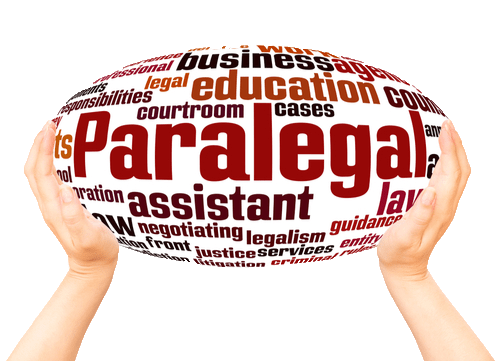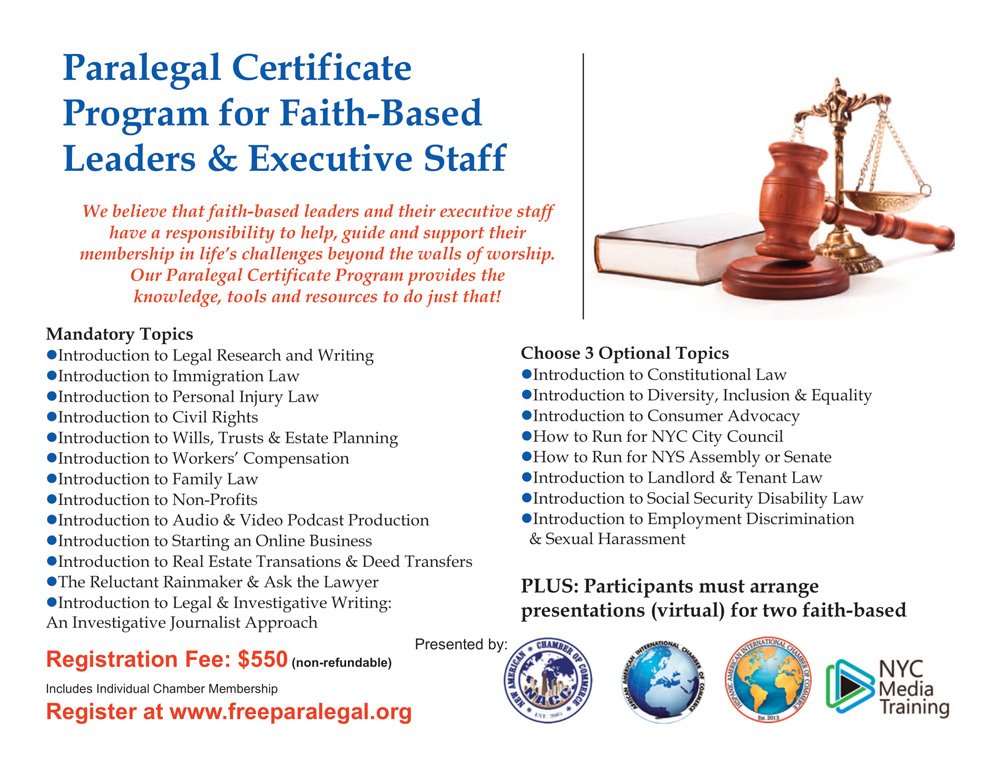-
 Why Enroll in the Paralegal Certificate Program?
Why Enroll in the Paralegal Certificate Program?
 Fastest Growing Industry. Pays Well. Path to Law School.Learn Skills that Are Transferable to Many Other Career Paths.Business Purpose: Startup or Expand Your Business. Advocacy: Civil Rights, Immigration.Training for Community Advocate. Stepping-Stone to a Political Career.Learn the Basics of Small Business. Learn How to Do Research Efficiently.CLICK HERE
Fastest Growing Industry. Pays Well. Path to Law School.Learn Skills that Are Transferable to Many Other Career Paths.Business Purpose: Startup or Expand Your Business. Advocacy: Civil Rights, Immigration.Training for Community Advocate. Stepping-Stone to a Political Career.Learn the Basics of Small Business. Learn How to Do Research Efficiently.CLICK HERE NYC Media Training, a 501(c)(3) approved organization
NYC Media Training, a 501(c)(3) approved organization
and supporter of the Paralegal Certificate Program. -
 Why Enroll in the Paralegal Program?
Why Enroll in the Paralegal Program?
Advocacy: Labor Rights, Civil Rights & Immigration 
-
 Why Enroll in the Paralegal Program?
Why Enroll in the Paralegal Program?
Paralegal Legal Clinic -
 Click Here To View Our
Click Here To View Our
Chamber Events 
-

Paralegal Certificate Program - Presented by Jared McCallister of NY Daily News (January 2022)
THE CHAMBERS' PARALEGAL PROGRAM
- Paralegal Certificate Program for New and Current Paralegals & Pre-Law Students
- Paralegal Certificate Program for Shop Stewards & Union Members
- Paralegal Certificate Program for Faith-Based Leaders & Executive Staff
- The Certificate in Legal Marketing is available to all participants of (1), (2) and (3) above.


Class Information & Links
The Chamber Paralegal Certificate Program includes these MANDATORY courses:
- Introduction to Legal Research and Writing
- Introduction to Legal & Investigative Writing: An Investigative Journalist Approach
- How to Win in Court/When Do You Represent Yourself in Court?
- Introduction to Immigration Law & Immigration Online (CALI Course)
- Small Business Boot Camp Series
- Introduction to Investigative Journalism (Required) - $50
- Introduction to CLIO, Case Management & Tools
- Introduction to Civil Rights
- Introduction to Wills, Trusts & Estate Planning
- The Reluctant Rainmaker
- Introduction to Bankruptcy Law & Taxation
- Introduction to Matrimonial Law - Contested & Uncontested
- Introduction to Workers’ Compensation
- Introduction to Non-Profits
- Paralegal Clinic
- Contracts (CALI Course)
- Property Law (CALI Course)
- Introduction to Personal Injury Law
- Introduction to Real Estate Transactions & Deed Transfers
- Introduction to International Trade & Global Business
- Resume & LinkedIn Workshop (Required) - $29.95
The Chamber Paralegal Certificate Program includes these OPTIONAL classes. Choose any 3 of the following:
- Introduction to Business Law & Small Business Solutions
- Introduction to Copyright & Trademark Law (CALI Course)
- Introduction to Criminal Law & Criminal Procedure (CALI Course)
- Introduction to Landlord & Tenant Law
- Introduction to Social Security Disability Law
- Introduction to Constitutional Law (CALI Course)
- Introduction to Evidence (CALI Course)
- Introduction to Employment Discrimination (CALI Course)
- Introduction to Accounting (CALI Course)
- Introduction to Labor Unions & Racism
- Introduction to Diversity, Inclusion & Equality in the Workplace
- Introduction to Diversity, Inclusion & Equality in Corporate Procurement
- Introduction to Consumer Advocacy
- Introduction to Labor Law: Your Rights in the Workplace
- Introduction to Article 78 Litigation
- How to Run for NYC City Council
- How to Run for NYS Assembly or Senate
- Introduction to Blogging Boot Camp (3 Classes) - $100
- Introduction to Legal Website Design Concepts (3 Classes) - $100
- Introduction to Event Planning & Strategies (5 Classes) - $150
- Introduction to Newsletter Development (3 Classes) - $100
- Introduction to Podcast Development - $100
Paralegal Certificate Program for New and Current Paralegals & Pre-Law Students

Paralegal Orientation Program For All New Students
Welcome to the Paralegal Certificate Program. At the orientation, you will:
1.Receive an orientation package.
2.Receive your CALI ID.
3.Receive your CLIO ID.
4.Receive a tour of the various websites pertinent to your educational needs
Register Now

Certificate in Paralegal Studies & Certificate in Legal Marketing
A Prerequisite: Paralegal Certificate
To graduate with an additional Certificate in Legal Marketing these are the required courses listed below:
• Introduction to Legal Marketing (10 Classes)
•Introduction to Blogging Boot Camp (3 Classes)
•Introduction to Legal Website Design Concepts (3 Classes)
•Introduction to Event Planning & Strategies (5 Classes)
•Introduction to Newsletter Development (3 Classes)
Program Registration

Paralegal Certificate Program for Labor Leaders & Members
We believe an educated worker is an empowered worker. We want to help all workers to understand and advocate for their rights effectively. Our Legal Training Certificate Program provides the knowledge, tools and resources to do just that! Program Registration.

Paralegal Certificate Program for Faith-Based Leaders & Executive Staff
We believe that faith-based leaders and their executive staff have a responsibility to help, guide and support their membership in life’s challenges beyond the walls of worship. Our Legal Training Certificate Program provides the knowledge, tools and resources to do just that! Program Registration.

WHAT FORMER STUDENTS SAID ABOUT THE CHAMBER PARALEGAL PROGRAM
Oxana Macnish
This program taught me a great deal about performing legal research, civil procedures and in taking it, I gained valuable knowledge in the law and its practice. The excellent training and legal education that I received will set a firm foundation for enriching my practice as a paralegal. I also believe that incorporation of NACC… Read more “Oxana Macnish”
Claude
It was a great joy for me to complete the paralegal program offered by NACC. I have absolutely no hesitation in recommending it to anyone who is seeking to extend their general knowledge of the law.
Ishaw H.
Knowledge is power indeed! The paralegal certificate enrollment was one of the most important and best decisions I’ve made! I encourage anyone that is thinking about advancement whether in their career or personal development, to enroll in the program offered here at the New American Chamber of Commerce (NACC) for several reasons: one is affordability;… Read more “Ishaw H.”

Markus Latimer
I completed the Paralegal Certificate Program in 2015. I found it really informative and interesting. Through the Program, I was exposed to many areas of the Law that I had not considered. It gave me a great foundation to build on. Thanks to the Program, I feel confident about what I can do in the future. I would recommend… Read more “Markus Latimer”
Jenny
After many years as a legal secretary, the paralegal program offered me the opportunity to further my professional development and to make me more marketable in the work force.
Ricci L. Niles
Do your future self a favor…I came to the Free Paralegal Certificate Program with the intentions of learning the fundamentals of the law and to cement my decision on whether I’d like to pursue law as a profession. I left with so much more. The classes are taught by Attorney Brian Figeroux and his vast network of… Read more “Ricci L. Niles”

Ask The Lawyer
with Attorney Brian Figeroux
Ask the Lawyer with Brian Figeroux, Esq. You have questions, we have answers on Immigration & Matrimonial Law, Wills, Estate & Trusts, Civil Rights, Personal Injury, Bankruptcy, Taxation, Landlord & Tenant, Workers’ Compensation, Social Security Disability and Real Estate Transactions. We bring you the latest updates on the law and community issues.
Podcast Description
Whatever you legal issue or concern, call us right now - 855-768-8845 or schedule an appointment at www.askthelawyer.us


